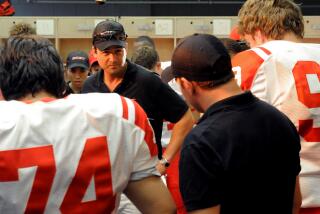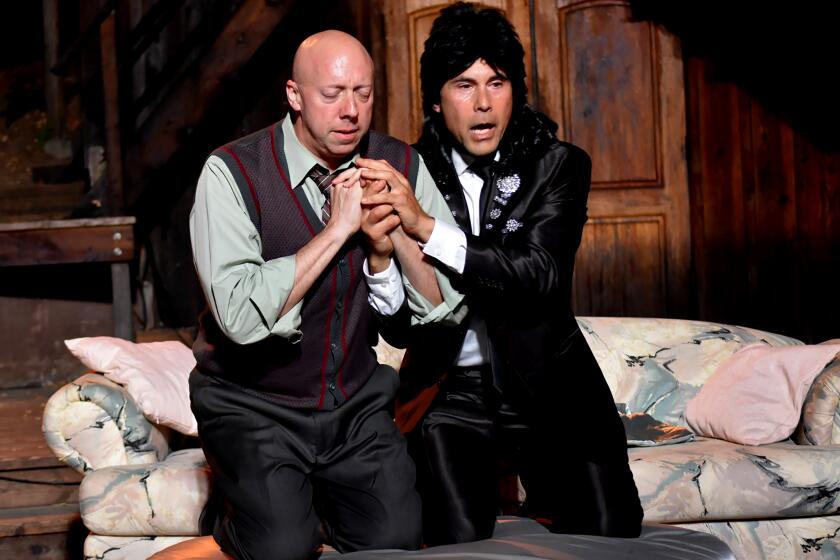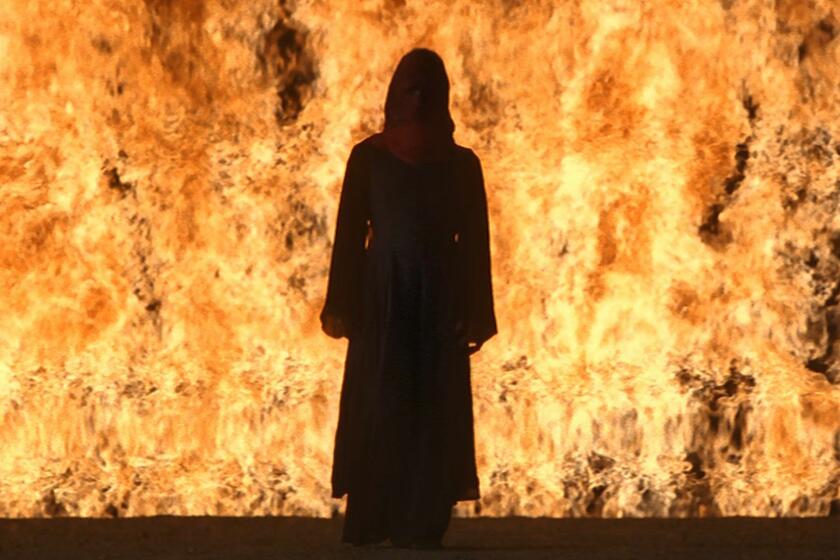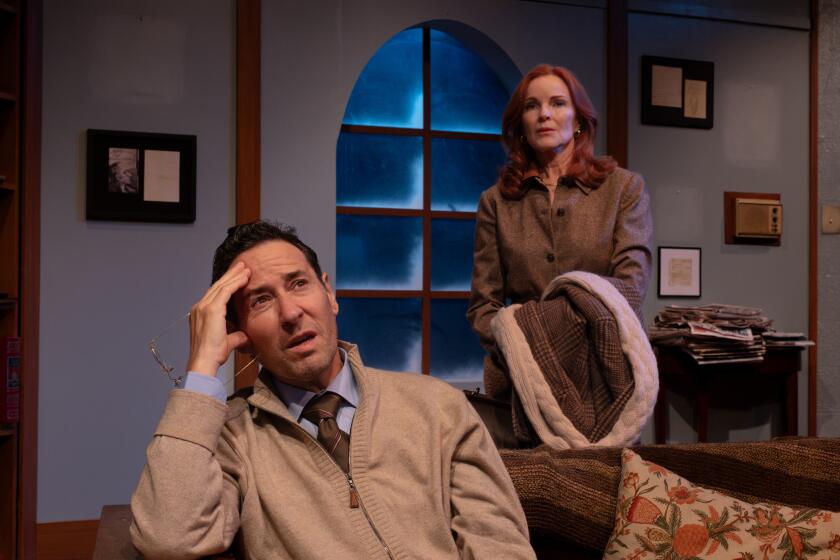As tireless as her model
Backstage at the Helen Hayes Theatre, a few hours before one of the last Broadway matinees of “Golda’s Balcony,” Tovah Feldshuh gears up for yet another extreme makeover. No, a plastic surgeon isn’t on duty. Yet in roughly half an hour, the lithe, attractive actress will add a couple of decades and an uncertain number of pounds to her appearance. She’ll also enlarge her nose, thicken her calves and don a wig of old-lady hair. The result, at once geriatric and indomitable, is a woman who can move mountains while complaining about her bad back.
Feldshuh’s transformation into the elderly Golda Meir, complete with arthritis and phlebitis, delivers more than just a fascinating historical figure for dramatic consumption. It humanizes discussion of a subject that is nothing if not controversial: Israel, from its founding as a state through its harrowing early decades of war with its Arab neighbors.
“The story of Israel’s birth is a complex one,” Feldshuh says. “It is a nation that was created as much by the global guilt in response to Hitler as by a historical longing of the Jewish people to return to their homeland. I think it’s especially important, at a time of such instability in the Middle East, to be reminded of how and why Israel came about.”
The actress has undergone this dressing-room routine more than 500 times already (not counting the four months of performances off-Broadway, where William Gibson’s “Golda’s Balcony” began). Last October, Feldshuh broke the Broadway record for the longest run in a one-woman show, previously held by Lily Tomlin in “The Search for Signs of Intelligent Life in the Universe.”
Feldshuh says her voice is temporarily wrecked from doing so much talking onstage (a concern for an actress who first made her mark in musical theater), and her hands are visibly banged up from slamming down a chair she uses to demarcate the different playing areas, from her Milwaukee adolescent home to her cabinet meetings with Moshe Dayan. But why complain when you’re blessed with a hit that’s both edifying and entertaining?
Glint of determination
Sharing Meir’s indefatigable commitment to getting the job done (“I’ve never missed a professional performance in New York in my life,” she boasts about a Broadway career that began with “Cyrano” in 1973), Feldshuh is, like her idol, a natural-born teacher with a commandingly maternal flair. Just ask her about her kids (one of whom is at Harvard, the other a straight-A student mired in SAT prep) and she’ll gladly fill you in on their educational triumphs.
Surrounded by flowers, thank-you notes, plaques from Jewish groups and signed photos of foreign dignitaries, Feldshuh can’t help but kvell at the runaway success of her show. “I created the title role in ‘Yentl’ on Broadway,” she says. “I’ve played Tallulah Bankhead, Diana Vreeland, Sarah Bernhardt. But I’ve never had a part as satisfying as this one.”
Vanity has little to do with it. Though she’s played her share of noteworthy parts in the theater (earning four Tony nominations, including one for “Golda’s Balcony”), and she has a thriving TV career (including her Emmy-nominated work as defense attorney Danielle Melnick on “Law & Order”), the pixie-ish 52-year-old has never been so proud to look so old.
Determination glints in her eyes when she talks about bringing “Golda’s Balcony” to L.A., where the show opens Wednesday at the Wadsworth Theatre as part of the Geffen Playhouse season. Though she’s a born-and-bred New Yorker (one who still jogs regularly around the Central Park reservoir), Feldshuh lived for a time in Southern California and can’t wait to bring this portrayal of a figure she compares to Abraham Lincoln and Gloria Steinem to her home away from home.
“Arnold Schwarzenegger bought my old house in Santa Monica,” she announces with a deafening handclap. “Governor, if you’re reading this, I want you in that audience. Richard Nixon, a Republican, came to Israel’s rescue. You should be there.”
Another person she hopes will see the show is Mel Gibson: “Before Golda moved to America, she was hiding under a staircase in Kiev during the pogroms, where the words ‘Christ killer’ were all too common. I hope Mel Gibson comes and sees the miracle of this play, written, by the way, by an Irish Catholic.”
William Gibson, the 90-year-old author of, among other plays, “The Miracle Worker,” “Two for the Seesaw” and an earlier Golda Meir drama simply titled “Golda,” explores Meir’s life from the vantage of the 1973 Yom Kippur War, when the fate of Israel depended on a combination of the prime minister’s iron will and U.S. military aid.
Serious and suspenseful, “Golda’s Balcony” leavens its concerns with plain-spoken wit. “ ‘Survival’ is maybe a synonym for ‘Jewish,’ ” Meir observes wryly. “That’s my story, what is the price for survival?”
Sparely staged, the tale fluidly unfolds as Meir, dying from cancer, surveys her personal and political past. The production opens with the sound of bombs exploding, a nerve-racking gambit, given the jangled nerves of audience members forced to undergo a heightened security check just to get to their seats. War, in all its demonic guises, is the true antagonist of the piece, which focuses on the escalating militarism needed to shore up Meir’s vision of a secure and independent Jewish state.
While clearly sympathetic to Israel’s predicament, Gibson examines the tragic costs of pursuing a utopian quest. Meir, often pictured as a chicken-soup-dispensing Mother Israel, has been the subject of much sentimental fascination in the States. (Think back to Ingrid Bergman, frail and at the end of her career, playing the terminally ill Meir in the 1982 TV miniseries “A Woman Called Golda.”)
“Golda’s Balcony” itemizes the personal failures (most painfully her marriage to Morris Myerson, father of her two children and the man who followed her from America to Israel only to lose her to the Zionist struggle) as well as the Faustian political tactics (including the development of nuclear weapons used to pressure the U.S. into more conventional military assistance).
“What happens when idealism becomes power?” Meir asks near the end of the play. “It kills. To save a world you create -- and this is a terrible question -- how many worlds are you entitled to destroy?”
The timeliness of these words isn’t lost on Feldshuh. “Our production opened on the brink of the Iraq war,” she says. “I said to the playwright, ‘If you make this about the ’73 war and our country is on the brink of a war that none of us want, then this play will have tremendous resonance for a wartime population.’ ”
Recalling fallen U.S. troops
Speaking knowledgeably about the Middle East, from the impact of the death of Yasser Arafat on the peace process to the spiraling violence in Iraq, Feldshuh vibrates with concern. “My personal assistant, Tara Goode, reads me the headlines every day before I go onstage.” The actress dedicated a recent show to the troops killed by a suicide bombing in Mosul. “While I don’t do or say anything directly,” she says, “I take those boys with me; their pictures stare at me before I go out there.”
The New York Times described her “fiercely committed performance” as embodying “an entire country, its hopes and paranoia and anger.” But the spirit of her work is anything but remote or foreign. She casts Meir’s actions emphatically in a present tense that is resoundingly our own.
Director Scott Schwartz says the strength of Feldshuh’s performance lies in her belief in Meir’s fundamental cause. “Tovah may have reservations about some of the political choices Israel has made, but the concept of a Jewish state is an important one to her. Golda is talking about the creation of Israel and its defense in the early days. I think there’s been a confluence of Tovah’s personal and political beliefs with her enormous talent and skill as an actress. It’s created a fire in her, which is pretty overwhelming to see.”
Late in the Broadway run, Feldshuh got into the habit of delivering a curtain speech in which she dedicates her work to the possibility of “war exhausting people into the lake of peace.” After some casual banter and Catskills-style shtick, she makes a serious plea: “If I have seen apartheid end in South Africa, if I have seen communism collapse in Russia, then in our lifetime ... through our ability to make a quantum leap as civilized human beings, we can bring about peace in this Middle East between Arab and Jew.”
Her elaborate costume will soon come off, but Feldshuh naturally wears Meir’s conviction.
*
‘Golda’s Balcony’
Where: Wadsworth Theatre, Veterans Administration grounds, 11301 Wilshire Blvd., Brentwood
When: Opens 7:30 p.m. Wednesday. Runs 7:30 p.m. Wednesdays and Thursdays, 8 p.m. Fridays, 4 and 8 p.m. Saturdays, 3 and 7 p.m. Sundays. Some exceptions; call for dates.
Ends: Feb. 20
Price: $20 to $64
Contact: (213) 365-3500; www.ticketmaster.com
*
Charles McNulty is the theater editor at the Village Voice. He can be reached at calendar@latimes.com
More to Read
The biggest entertainment stories
Get our big stories about Hollywood, film, television, music, arts, culture and more right in your inbox as soon as they publish.
You may occasionally receive promotional content from the Los Angeles Times.







